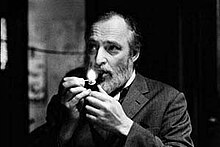Asger Jorn
| Asger Jorn | |
|---|---|

Asger Jorn photographed in 1963 by Erling Mandelmann
|
|
| Born |
Asger Oluf Jørgensen 3 March 1914 Vejrum, Jutland, Denmark |
| Died | 1 May 1973 (aged 59) Århus, Denmark |
| Nationality | Danish |
| Known for | Painting |
| Notable work | Stalingrad |
Asger Oluf Jorn (3 March 1914 – 1 May 1973) was a Danish painter, sculptor, ceramic artist, and author. He was a founding member of the avant-garde movement COBRA and the Situationist International. He was born in Vejrum, in the northwest corner of Jutland, Denmark, and baptized Asger Oluf Jørgensen.
The largest collection of Asger Jorn's works—including his major work Stalingrad—can be seen in the Museum Jorn, Silkeborg, Denmark.
He was the second oldest of six children, an elder brother to Jørgen Nash. Both of his parents were teachers. His father, Lars Peter Jørgensen, was a fundamentalist Christian who died in a car crash when Asger was 12 years old. His mother, Maren, née Nielsen, was more liberal but nevertheless a deeply committed Christian. This early heavy Christian influence had a negative effect on Asger who began progressively to inwardly rebel against it, and more generally against other forms of authority.
In 1929, aged 15, he was diagnosed with tuberculosis although he made a recovery from it after spending three months on the west coast of Jutland. By the age of 16 he was influenced by N. F. S. Grundtvig, and although he had already started to paint, Asger enrolled in the Vinthers Seminarium, a teacher training college in Silkeborg where he paid particular attention to a course in 19th century Scandinavian thought. Also at about this time Jorn became the subject of a number of oil paintings by the painter Martin Kaalund-Jørgensen, which encouraged Jorn to try his hand in this medium.
When he graduated from college in 1935, the principal wrote a reference for him which said that he had attained 'an extraordinary rich personal development and maturity' – especially because of his wide reading in areas outside the topics required for his studies. While at college he joined the small Silkeborg branch of the Communist Party of Denmark and came under the direct influence of the syndicalist Christian Christensen, with whom he became close friends and who, Jorn was later to write, was to become a second father to him.
...
Wikipedia
